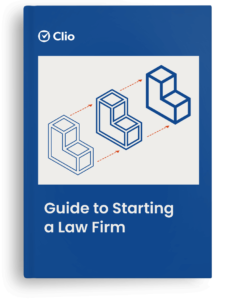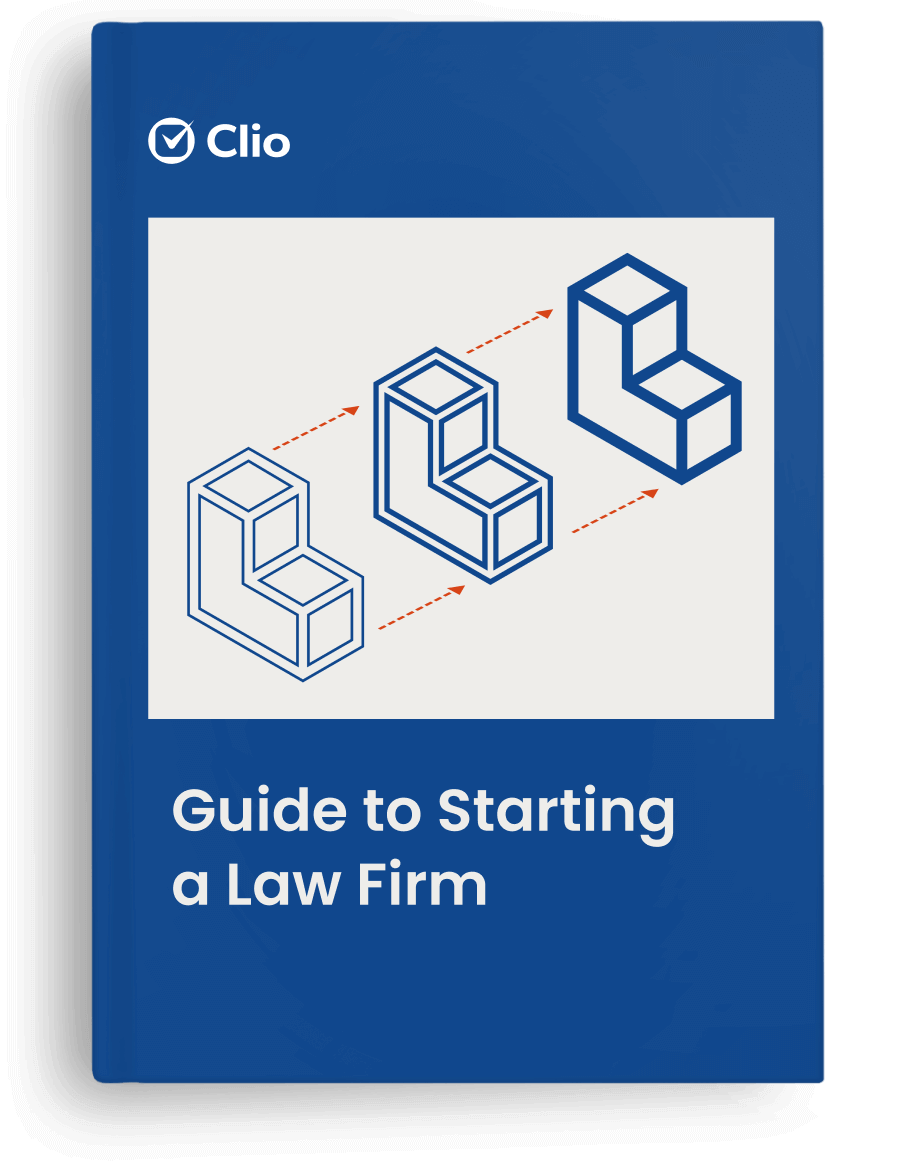There is so much to consider when starting your own law firm. Deciding to hang your own shingle is an exciting journey that can be very rewarding. As starting your own law firm involves a lot of research, planning, and work, it’s a good idea to build up a reliable support network of friends, family, colleagues, and mentors that will help lead you on the path to success.
Whether it be for general small business upkeep advice or practice area specific advice, the right people are there to help you—if you know where to look.
Assembling an all star law firm staff
When you first start your law firm, your full-time employee count will likely stay at one for a while. But during this period, you may also decide that you need part-time or contract help.
This is when hiring staff for your law firm quickly becomes top of mind. Some of the initial staff positions can include:
- Legal assistants / Paralegals
- Office managers
- Legal consultants
When hiring a legal assistant or paralegal, you can hire locally or remotely (virtual legal assistant). A legal assistant is immensely helpful for:
- Administrative tasks (i.e. data entry)
- Freeing up your time to focus on delivering better client service
- Allow you to bring on more law firm clients
- Empowering you to effectively handle matters and other tasks
Similarly, paralegals can improve your law firm’s efficiency, save you time, and help provide a better overall client-centered experience.
Depending on your area of practice, a legal assistant’s scope of work could include:
- Scheduling appointments
- Billing and accounting
- Managing contracts
- Reviewing documents
- Legal research
Remember to keep timing in mind when staffing your law firm. If you hire too early, there may not be enough work to justify having an entire legal staff.
So, how do you know when it’s time to hire staff for your law firm? Some signs include:
- You find yourself taking on too much work
- Your client experience is suffering
- You’re struggling to manage your day-to-day tasks
- You can’t take on any new cases
It’s helpful to look at how much of your time goes to billable work, too. Clio’s 2023 Legal Trends for Solo Law report found that solo lawyers complete only two hours of billable work each day. This indicates that they’re spending far too much time on administrative tasks—and could benefit from some extra help.
Everything you need to start a law firm—in one checklist How to Start a Law Firm Checklist
Hire a legal consultants
When you first start out, it’s unlikely that you’ll be staffing your law firm right away. Which makes law firm consultants an attractive alternative.
Unlike full time staff legal assistants, consultants work almost exclusively on contracts. From web designers and bookkeepers to IT consultants and more, hiring an expert can make starting your own law firm much easier and more manageable.
When hiring a legal consultants, here are a few things to keep in mind:
- Qualifications: You need to know whether a consultant is qualified to make sure they will do the best job possible. Ask for examples of their work, references, and certifications.
- Location: While most consultants have shifted to remote work, consider whether location matters. Different jurisdictions have specific regulations for lawyers, so it may be wise to hire local consultants who are more familiar with those requirements.
- Working hours: When you start your law firm, you may not be working the traditional 9-5 hours. Instead, you may need to work early mornings, late evenings, or throughout the day. You may also find yourself without a set schedule, depending on your workload. Be sure to coordinate working hours with consultants to ensure meeting times are aligned, especially if you are in different time zones.
- Support: Before starting a project with a consultant, ask if they can provide ongoing support. For example, if your systems need upgrading after an IT consultant sets them up for you, will they assist in providing instructions or guidance?
- Rates: Lastly, you should compare rates between consultants to get the best return on investment (ROI). Remember, a good ROI doesn’t mean the cheapest rate. Compare and get quotes from at least two or three options before committing.
Invest in staff training and development
In many jurisdictions, lawyers must complete continuing legal education (CLE) requirements to maintain their licenses to practice law. After all, being a lawyer means keeping up to date with the latest changes in law, technology, and practice management.
When it comes to training and development, it’s important to balance your CLE requirements with additional upskilling as a new business owner.
There are also programs that fit your CLE requirements while showing the fundamentals of owning a solo law firm:
Some programs are free, while others charge a fee. However, depending on the content and lessons involved, it can be a worthwhile investment. When you first start your law firm, it’s always a good idea to be lean—but the key is to spend wisely on positive, long-term investments.
For instance, Clio offers free courses that meet your CLE expectations and requirements. Every month, we bring in experts to speak on cases and updates, new legal technologies, and best practices for running your law firm. Courses range topics like AI in Legal Marketing and How to Automate Client Intake.
View our upcoming CLE-eligible event schedule here
Find your community
There’s a lot more to running your own firm than just practicing law.
You also need to keep the operations side running smoothly. And that’s where legal insights and resources can be a big help. These include:
- Knowledge on setting your rates
- How to file during tax season
- How to keep growing your business
Take it from Stephen C. Paul, who with the help of Pitt Legal Services Incubator, a program designed to help lawyers hang their own shingle, Stephen learned the fundamentals of running a business.
Find your own community through events put on by your local bar association or by small business associations. You could also join Facebook or LinkedIn groups to connect with lawyers in your local jurisdiction.
Here are some other communities to get you started:
- LawyerSmack: LawyerSmack is an online community with 100+ channels dedicated to different legal topics, including one just for starting your own law firm. Members range from local to international and bring a wide range of experiences.
- r/LawFirm on Reddit: While this forum is a more informal option, it’s a good choice to find casual discussion, and talk about the nuts and bolts of running your law firm. If you are a licensed attorney, you can also apply to get access to the lawyer subreddit.
- The Law Community (TLC): With legal tech at the heart of TLC, this community that gives legal professionals an online space to share tips, best practices, and pick up new tech skills.
Taking advantage of online resources can be helpful as well. The Clio blog has scores of articles—from how to write a law firm business plan, to what technology your law firm will need, to tips for staffing a law firm.
Final thoughts on finding the right people for your law firm
Proper research and planning can help set your law firm up for success. But having a support system can make a big difference when you run into challenges. Starting your own law firm will be made so much easier by learning from consultants, other lawyers, and mentors.
You don’t need to get everything right on the first try. Getting started is the important part. But if you’re keen to start hiring and aren’t sure where to start, check out our free guide on how to hire for success, which covers the bet recruitment practices to guide your hiring journey.
Download Clio's Complete Guide to Starting a Law Firm
Set yourself up for success with our free Guide to Starting a Law Firm, with advice from successful founding partners.
Get the Guide



